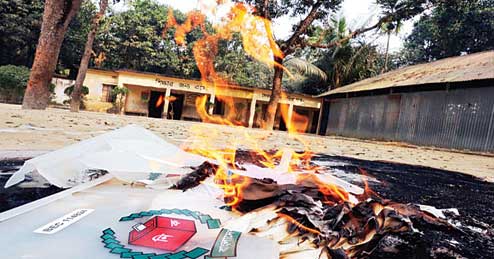Published in The Telegraph (Calcutta) on Monday, 6 January 2014.
Bangladesh holds ‘shunned’ polls
Devadeep Purohit
Jan. 5: Bangladesh today held a general election and the bets are not on who the winner will be but on when the next polls will be called.

The token election — variously described as “farce”, “sham” and “illegitimate” after an 18-party Opposition alliance boycotted it — is said to have clocked a low turnout.
At least 21 people were killed during the day. Vandalism and arson broke out at night in Jessore, targeting groups that support the ruling Awami League, sources said.
The formality of the election is expected to ensure the continuation of Sheikh Hasina Wazed as Prime Minister and prolong political instability. Out of the 300 seats in the parliament, elections were held only in 147 seats as candidates had won uncontested in the remaining — and majority — 153 seats.
Local media and the Opposition claimed the turnout was around 10 to 15 per cent and that some booths had failed to draw even a single voter.
No official figure on the turnout was released till late tonight. Awami League sources claimed victory and cited a turnout of 35 per cent — far below the usual 70 per cent.
Tofail Ahmed, member of the advisory council to the ruling Awami League, told The Telegraph over the phone that the election was “peaceful, barring a few sporadic incidents of violence”. Till late this evening, at least 21 people were feared killed and over 200 polling stations had been burnt down.
“The Opposition, led by the BNP (Bangladesh Nationalist Party), tried their best to derail the election…. But they failed miserably and people came out to vote. This is a clear indication that the people of Bangladesh are with Hasina,” said Ahmed.
Hasina was locked in a bitter battle with Khaleda Zia, former Prime Minister and BNP leader, in the run-up to the election. The BNP, along with its ally Jamaat-e Islami, had held the country to ransom demanding a caretaker poll-time government.
Despite requests from the international community, including the UN, a consensus could not be reached and the one-sided election took place.
The counting started at 4pm and all the results are expected to be out before tomorrow morning. But there was hardly any interest in the results in Dhaka.
“The question on everybody’s mind is whether peace and stability will be restored after the election. Regrettably, these elections will not bring an end to the violence and uncertainties,” said Debapriya Bhattacharya of the Centre for Policy Dialogue, a Dhaka-based think-tank.
“Till participatory, transparent and fair elections are held under a credible electoral management, peace and stability will hardly return to Bangladesh,” he added.
The uncertainty has already cast a cloud on the cash cow — readymade garment exports — with reports of large-scale cancellation of orders trickling in.
Investments — both public and private — have dwindled in the recent months, along with remittances from abroad. These factors are likely to slam the brakes on the growth of the economy, which has been growing at rates between 6 and 7 per cent in the past few years.
Signalling no quick end to the instability, the BNP-led Opposition alliance has called a two-day countrywide hartal from tomorrow morning to press its demand to cancel the election results.
Shafik Rehman, a writer and columnist known for his proximity to Khaleda, said the BNP would intensify its movement against the Awami government. “The Opposition cannot allow an illegitimate government to run the country and I don’t think that this government will last,” said Rehman.
A similarly one-sided poll in 1996, boycotted by the Awami League, had witnessed a mere 7 per cent turnout and forced Khaleda to call fresh polls within months under a neutral non-party caretaker system.
A section in the Awami League, however, is confident that the government can tide itself over the crisis by taking strong administrative action against the Opposition and launching a series of development initiatives after the formation of the new government, besides carrying out the death sentences on some of those convicted of the 1971 war crimes.
Punishment for the war criminals — who had sided with the Pakistani Army during the war of independence in 1971 — is an emotive issue in Bangladesh.
“There are chances of an emergency-like situation to facilitate a crackdown on the Opposition… But that may not be successful as a state of emergency and development cannot go hand in hand,” said a senior editor of a leading newspaper, who did not wish to be named.
One of the biggest challenges before the new government is expected to be posed by the international community, which is in favour of a participatory election process.
“Although the Awami League will win the election, their leaders know that the government will not have any credibility,” said a diplomatic source in Dhaka, explaining the need for another election with the participation of all the parties.
Whether the international community will recognise the government or not is likely to be clear over the next couple of days, he added.
India’s response will also be critical. “It is widely believed here that Hasina could push through this election only because of India. Now it remains to be seen whether the new government gets the support of New Delhi,” the diplomat added.
Hasina has been banking on India for over the past two years to sign the Teesta accord and the land boundary agreement which will allow the two nations to swap enclaves embedded in each other’s territory.
Sources in the Indian foreign ministry have already started predicting another election.
An Awami League source said: “There can be another election but for that, the BNP has to show a certain degree of flexibility.… They will have to shun the politics of street protests and dissociate themselves from the Jamaat, which has been at the forefront of all the violence.”



